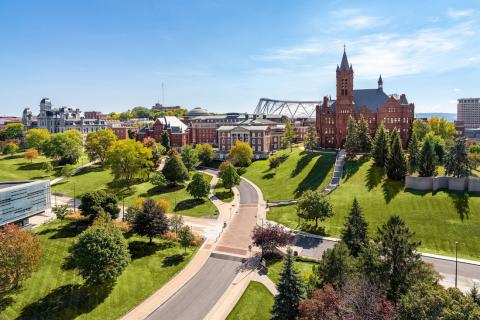Syracuse University
Institute

Steven Blusk, Professor of Physics
201 Physics Building
Syracuse University
Syracuse, NY 13244
USA
+1 (315) 443 3158

Steven Blusk, Professor of Physics
201 Physics Building
Syracuse University
Syracuse, NY 13244
USA
+1 (315) 443 3158
The high energy physics group at Syracuse University consists of six professors: Marina Artuso, Steven Blusk, Matt Rudolph, Tomasz Skwarnicki, Sheldon Stone and Mitch Soderberg; research professors Dr. Ray Mountain and Dr. J. C. Wang; 3-4 postdoctoral researchers, and typically 6-7 graduate students.
Profs Artuso, Blusk, Skwarnicki and Stone and collaborate on the LHCb experiment at CERN, which is designed to make precise measurements of decays of beauty and charm hadrons. Such measurements provide a complementary probe to direct searches for new particles, with the goal of uncovering new physics. The sensitivity to new particles at high mass, well beyond that which can be reached by direct production, occurs through virtual quantum loops. These quantum loops should contribute to bottom and charm hadron decays in certain final states. The size of the effects will depend on the masses of the new particles and their couplings to the quarks involved in the decay process. These studies could therefore lead to a discovery of new physics, provide contraints, or rule out large classes of models of new physics. LHCb has also proven to be an extremely versatile "general purpose detector", allowing for exploration of other Standard Model topics, including (but not limited to) quarkonia, exotics searches, diffractive production studies, W & Z production measurements, charm and bottom spectroscopy, lifetimes, and much more!
Prof. Soderberg conducts research in neutrino physics, which also may unlock key clues about physics beyond the Standard Model. With the dsicovery of neutrino mass in the mid-1990's, a whole new set of questions need to be addressed, such as: What are the valuess of the elements of the neutrino mixing matrix ? Is there non-zero CP violation in the neutrino sector? Are the neutrinos their own antiparticles (so-called "Majorana" particles)? To carry out this research program, Prof. Soderberg collaborates on the ArgoNeuT experiment, in addition to being the spokesperson. He also collaborates on the MicroBoone experiment, and is involved in the LBNE (Long Baseline Neutrino Experiment) project.
The group is supported by National Science Foundation.

